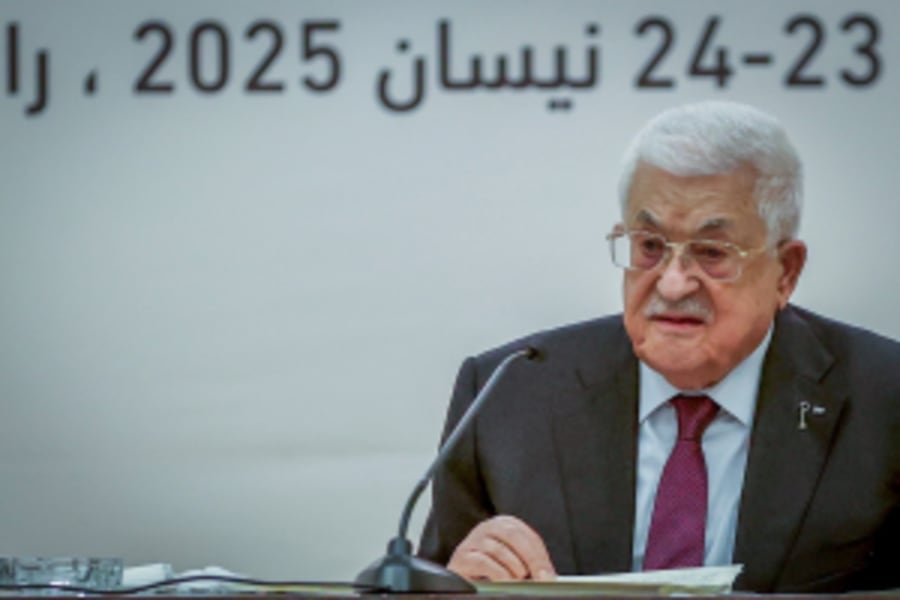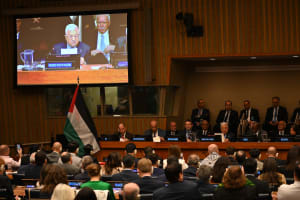Not just PA officials, US suspends new visas for all Palestinian passport holders
Visa denial is a temporary move, likely meant to counter attempts to recognize a Palestinian state at UN General Assembly

The administration of U.S. President Donald Trump has suspended approval of visas for Palestinian passport holders, the New York Times reported on Sunday evening.
The move comes just days after the Trump administration announced that it would not approve entry to Palestinian Authority President Mahmoud Abbas and a delegation of over 80 Palestinian officials, who were planning to attend the UN General Assembly in New York, which starts next week.
Announcing that decision, the State Department said, “It is in our national security interests to hold the PLO and PA accountable for not complying with their commitments, and for undermining the prospects for peace.”
That statement cited the PLO Commitments Compliance Act of 1989 (PLOCCA) and the Middle East Peace Commitments Act of 2002 (MEPCA), saying that the PA and the Palestinian Liberation Organization (PLO) had violated their commitments by “initiating and supporting actions at international organizations that undermine and contradict prior commitments in support of Security Council Resolution 242 and 338, taking actions to internationalize its conflict with Israel such as through the International Criminal Court (ICC) and International Court of Justice (ICJ), continuing to support terrorism including incitement and glorification of violence (especially in textbooks), and providing payments and benefits in support of terrorism to Palestinian terrorists and their families.”
That move was widely believed to be a response to attempts to recognize a Palestinian state during the UNGA, organized by France, Saudi Arabia, and several Western nations.
The new visa freeze applies to all Palestinian passport holders, and restricts them from receiving almost any type of entry visa, the Times reported. Palestinian passports were first issued in the 1990s, following the signing of agreements between Israel and the PLO to establish the Palestinian Authority as a semiautonomous government for the Palestinians in the territories of Judea and Samaria, as well as Gaza.
The visa restriction does not apply to current holders of U.S. visas or Palestinians with dual citizenship or who have passports from another country. However, the restrictions will affect visas for university students, people seeking medical treatment, business visas, and family visits.
According to the Times report, the new restrictions were detailed in a cable sent by the State Department to all U.S. embassies and consulates on August 18. While no apparent explanation was given for the new restrictions, it is believed that they are related to the attempts to recognize a Palestinian state at the UNGA.
Specifically, the State Department instructed consular officers to invoke section 221(g) of the Immigration and Nationality Act of 1952, which is a mechanism used to temporarily deny a visa application until eligibility can be determined by officials.
“Effective immediately, consular officers are instructed to refuse under 221(g) of the Immigration Nationality Act (INA) all otherwise eligible Palestinian Authority passport holders using that passport to apply for a nonimmigrant visa,” the State Department cable said.
A visa refusal under 221(g) usually means that there is a lack of certain information or documentation in order for the consular official to grant the visa request. However, in some instances, as in the current situation, it is due to “administrative processing” requirements imposed by Washington, requiring a decision by State Department or other federal agency officials.
The Trump administration has expressed its disapproval of the push for recognition of a Palestinian state at this time, and Israeli leaders have condemned it as a “reward for terrorism.” Even Hamas leaders have said the push for recognition of a Palestinian state is “the fruit of October 7.”
France, Britain, Canada, and Australia have announced their intention to recognize a Palestinian state during the UN General Assembly this month.
According to a statement by the State Department, the U.S. “remains open to re-engagement – but only if the PLO and the Palestinian Authority uphold their commitments and take concrete steps to return to the path of compromise and coexistence with the State of Israel.”

The All Israel News Staff is a team of journalists in Israel.
You might also like to read this:

















